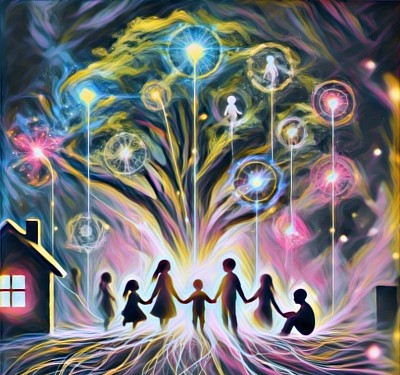Returning to Reason
A Healed and Empowered Society
Finding Camelot is uniquely designed to foster emotional intelligence and heal generational trauma, offering a model for personal and communal transformation.
Our structure and values create a nurturing environment where members can reconnect with themselves and others, breaking harmful cycles and fostering resilience, empathy, and self-awareness.
By fostering emotional intelligence and addressing the root causes of generational trauma, Finding Camelot is laying the groundwork for a society where individuals are whole, relationships are harmonious, and the cycles of pain and disconnection are broken. This is not just about survival; it’s about creating a culture where everyone has the opportunity to thrive emotionally, socially, and spiritually.
Our Philosophy of Gentle Accountability
At Finding Camelot, our philosophy of gentle accountability is integral to the communal living experience across all our households. This foundational principle relies on the communal environment as a natural enforcer of what is socially acceptable, which helps manage and moderate behaviors through the presence of our peer groups.
Being Observed as a Behavioral Check:
- The simple act of being seen by others serves as a subtle but effective check on behaviors that may be antisocial or harmful.
- The visibility of actions within communal settings creates a natural deterrent to negative actions and encourages a more socially aware and considerate community.
Supportive Interventions:
- Gentle accountability allows for the community to address issues in a supportive, rather than punitive, manner.
- When behaviors that disrupt communal harmony are observed, the community can engage in supportive interventions.
- These include discussions that aim to understand the root causes of such behaviors, offering support or resources to address them, and providing constructive feedback to encourage better choices.
Cultivating a Culture of Mutual Respect:
- This philosophy also fosters a culture where mutual respect and support are paramount.
- We empower our members to participate actively in shaping a community that values respect, inclusion, and personal growth.
Empowering Personal Responsibility:
- Members are encouraged to take personal responsibility for their actions.
- The communal environment supports individuals in recognizing the impact of their behavior on others.
- This promotes a shift towards more positive interactions and personal development.
At Finding Camelot, gentle accountability is more than a policy; it’s a way of life that enhances the well-being of every community member, fostering environments where everyone is motivated to act as responsible and proactive members of their community.
A Childhood Rooted in Community
Every child deserves the benefits of growing up in a large, loving family—without the financial strain or exhaustion that often comes with it. Our communal living model provides a built-in village where children thrive in a socially rich, supportive environment, while parents share responsibilities and regain balance in their lives.
1. A Built-In Social Network
- Children naturally learn through interaction
- In a communal setting, they develop key social skills—cooperation, empathy, and responsibility—by growing up alongside peers
- They have a diverse range of role models and friendships.
2. More Guidance, More Care
- Raising children takes time and energy, and no single parent can do it all alone
- In a communal home, dependants benefit from multiple trusted adults who provide guidance, supervision, and mentorship
- Children receive more attention, not less
- Parents gain the peace of mind that comes from knowing they are never alone in meeting their children’s needs
3. Freedom to Grow, Stability to Rely On
- Communal structure balances independence with support
- Children experience the security of knowing they always have a place within the community, while also learning age-appropriate responsibility
- Younger children have constant supervision, while older kids gain increasing responsibility and independence
- This prepares them for adulthood in a way that fosters confidence rather than fear.
4. A Childhood Without the Stress of Adult Burdens
- Financial stress of parents often trickles down to children, shaping their sense of stability and security
- Communal living removes that weight, ensuring that every child grows up in an environment where basic needs are met, resources are shared, and life’s uncertainties don’t disrupt their sense of home.
At Finding Camelot, we’re redefining what it means to raise a family—creating a space where children don’t just grow up, but truly thrive.
Supporting Growth and Development
At Finding Camelot, we believe that adulthood is not just a milestone but a journey—one that requires guidance, structure, and intentional support. Our approach to structured independence is designed to instill confidence, responsibility, and self-sufficiency while ensuring that every member, regardless of age, has the support they need to thrive.
A Balanced Approach to Independence
Our philosophy is rooted in the idea that true independence and autonomy comes from structured opportunities for growth rather than sudden or forced self-reliance. We achieve this through:
- Gradual Responsibility Progression – Members and dependents take on increasing responsibilities based on their abilities and readiness.
- Age-Appropriate Privacy and Autonomy – Dependents are given privacy levels that match their developmental stage, ensuring they grow up with the right balance of security and freedom.
- Community Support with Individual Agency – While dependents are encouraged to make choices and work through conflicts independently, support and guidance is always available.
We want to prepare children for adulthood by framing responsibilities as a path to independence, not a burden.
Our model addresses the modern challenge of failure to launch syndrome. By experiencing progressive responsibility and structured decision-making, they develop the skills necessary for long-term personal and financial stability.
Structured Independence: The Tools to Thrive
Structured independence is the idea that children should be given the space to take ownership of their responsibilities and experience the natural consequences of their choices within a safe and nurturing environment. This allows them to:
- Make Choices
- Solve Problems
- Develop Self-Discipline
Instead of micromanaging every decision, we provide children with age-appropriate freedoms, all while having a reliable framework of guidance and support.
We embrace this approach because it balances privilege with expectation, ensuring that children develop responsibility, confidence, and self-reliance in a safe, supportive environment.
Communal Living is Uniquely Suited
Traditional living and parenting models often swing between extremes, with children either spoiled or left to fend for themselves. Communal living offers a balance—providing enough structure to guide development, but enough freedom to allow growth.
- A Village of Role Models – In a communal setting, children learn from multiple adults, not just their parents. They see different approaches to problem-solving, responsibility, and discipline, which helps them develop a well-rounded sense of independence
- A Safety Net, Not a Crutch – Mistakes are part of learning. In a communal home, children can take risks, make choices, and face consequences while still having a strong support system to guide them through challenges.
This approach recognizes that independence is not something suddenly granted at adulthood—it is built, step by step, from an early age.
A Trauma-Informed Community
At its core, Finding Camelot operates as a trauma-informed space—a community that acknowledges the impact of generational trauma and actively works to disrupt it. This is reflected in the supportive communal living model and programs like CareShare, where members take turns helping each other with childcare and other emotional labor.
1. Breaking Cycles of Isolation
Generational trauma often isolates individuals and families, perpetuating patterns of mistrust, shame, and disconnection. Finding Camelot’s model creates intentional relationships that foster belonging and mutual respect.
How It Fosters Connection:
- Weekly household meetings encourage open dialogue and collective problem-solving, teaching members to express needs, listen actively, and collaborate without fear of judgment.
- Members are supported in practicing vulnerability in a safe environment, learning how to ask for and provide help—a crucial skill for overcoming trauma.
2. Using Privacy as a Tool
Finding Camelot views privacy as a precious commodity, particularly in communal living. By offering tiered accommodations based on room credits, it ensures that everyone has access to private space when they need it.
How It Heals Trauma:
- The intentional balance of private and shared spaces teaches members to set and respect boundaries.
- Privacy fosters self-reflection and emotional regulation, allowing individuals to decompress and process their emotions.
3. Multi-Generational Support Systems
Generational trauma often results from unmet needs cascading through families. Finding Camelot interrupts this by creating multi-generational support systems, where elders, adults, and children coexist in a balanced and mutually supportive environment.
How It Heals Trauma:
- Elders contribute wisdom and stability, while younger members bring energy and innovation, creating a sense of continuity and purpose for all ages.
- Members have the opportunity to rewrite harmful narratives by witnessing and participating in healthier relationships.
4. Changing the Narrative
The philosophy of Finding Camelot directly challenges the narratives of scarcity, individualism, and competition that perpetuate trauma on a societal level. Instead, it champions abundance, collaboration, and mutual care.
How It Heals Trauma:
- Members are immersed in an environment that proves another way of living is possible, breaking the internalized beliefs that lead to fear, mistrust, and conflict.






